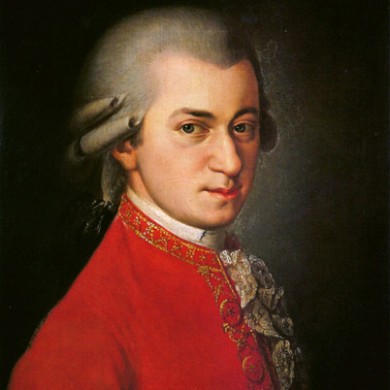Soprano Peterman impresses in Miami Music Fest’s mixed “Magic Flute”

Mozart’s “The Magic Flute” was presented by the Miami Music Festival Thursday night at Temple Emanu-El in Miami Beach.
A synagogue may not be the obvious venue for a Mozart opera. But Miami Beach’s domed Temple Emanu-El, modeled after the Grand Synagogue of Algiers, turned out to be an evocative setting for the Masonic themes and symbolism of The Magic Flute.
The Miami Music Festival performed a children’s version of the opera Thursday, replacing the German dialogue with English, making several cuts and ditching the racist elements. Although there was some excellent singing and clever stage direction, the performance was not the festival’s best, with uneven playing by the orchestra and too much mediocre singing in principal roles.
Founded in 2014, the Miami Music Festival serves as a training institute for young musicians and provides audiences with a welcome series of summer programs, often tackling repertoire, such as Wagner, rarely heard in South Florida.
The best voice of the evening belonged to Avery Peterman, who sang the role of Pamina. The soprano brought a sweet, rich tone to her desperate plea to Sarastro. Even small moments, such as the flourish at the end of her duet with Papageno, came off with style and grace. And in her lament at what appears to be Tamino’s indifference, she sang with easy and accurate fast notes and expressive ornamentations in a lustrous voice redolent with grief.
As the hero Tamino, the tenor Minghao Liu effectively conveyed the character’s growth, from his rather unheroic first appearance–running away from a snake–to his calm demeanor in with the physical dangers of his initiation. Liu produced tones with an easy lyricism, bringing gleaming notes to the upper register in his Act I ria in which he contemplates the portrait of Pamina.
Perhaps the most memorable tune of the opera is Papageno’s aria “Der Vogelfänger bin ich ja,” in which the humble birdcatcher explains how he makes his living. But the baritone Timothy Gorka sang in a voice that was underpowered and thin, without the earthy vigor the aria seemed to demand. He improved through the evening, though, and gave a more creditable performance of “Ein Mädchen oder Weibchen,” doing an effective job of getting progressively drunker as the Three Spirits refill his wine cup.
As the Queen of the Night, the dark monarch who beats underlings into submission with her coloratura, the soprano Ann-Marie Iacoviello was at times brilliant, at other times erratic. She has the most fiendishly difficult music to sing, and for the most part, brought it off. She nailed most of the impossibly stratospheric notes of her famous aria “Der Hölle Rache,” although her notes landed high or low of the mark several times. But she sang with bloodcurdling fury and urgency, producing notes of brilliant intensity.
The interior of the Miami Beach synagogue, with its elaborate stone and wood carvings, was so ornate that the absence of much in the way of scenery or props didn’t matter. Witty stage direction by David Toulson helped. As Tamino plays the flute, for example, and the stage directions call for various animals to gather to listen, the three spirits throw a series of stuffed animals in front of him from the wings.
The orchestra, led by the pianist and conductor Thomas Bagwell, gave an uneven performance. There were intonation issues in the violins throughout the evening, as well as scrappy playing in Mozart’s fast-moving melodies. But the orchestra provided solid support to the singers and achieved symphonic grandeur at big moments, such as the stirring music as Tamino and Pamina prepare for their trial by fire and water and the triumphal last moments of the opera.
As the high priest Sarastro, the tall, bearded bass baritone Alejandro Cardona provided an imposing physical presence. Although he sang at times with a burnished, velvety tone, he lacked the commanding voice to bring off the role of the monarch. “In diesen heiligen Hallen” felt earthbound, without the soaring, golden lyricism it needed to come off.
As the queen’s three female emissaries, Esther Peterson, Cristina Gallo and Jade Espina made a formidable trio of Ladies, with they spears and intimidating eye makeup. The sang in pure tones, with vivacious humor. Also handling their ensemble roles with style and humor, as well as sparkly blond wigs, were the singers who portrayed the Three Spirits who guide Tamino and Papageno, sung by Alexandra Gilliam, Sangmi Kwon and Hannah Lawrence.
As The Speaker Dylan Evans lacked the power needed to intimidate, and his command “Zurück!” (Back!) to Tamino could barely be heard. The role of Monostatos, the Moorish henchman to the king, was shorn of its racism and played by Arthur Beutel with an engaging delight in his own evil.
The Magic Flute will be repeated 1 p.m. Sunday, 7:30 p.m. July 25 and 1 p.m. July 28 at Temple Emanu-El in Miami Beach. For the Sunday performance, the role of Tamino will be sung by Andres Lasaga, the Queen of the Night will be sung by YeonHa Park and Pamina will be sung by Kristina Brost. miamimusicfestival.com
Posted in Performances
Leave a Comment
Fri Jun 28, 2019
at 1:24 pm
No Comments




